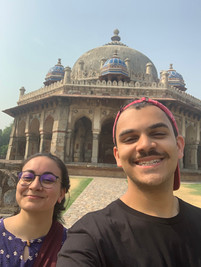Kaabira
- Dhruv Shah

- Jul 13, 2019
- 4 min read
Updated: Aug 25, 2019

Kaabira: a reference to the 15th-century Indian mystic and poet Kaabir Das, who renounced his original home and family to instead travel and learn about the world's philosophy.
Delhi was weird. I stepped off the plane and everything felt...normal. Babies were crying. The frigid airport AC blasted my face just right. Those who got off the plane were predominantly brown-skinned, but there was the occasional white person. It didn’t feel like I had truly arrived. I felt in a weird limbo—as if my plane had taken off from JFK and instead of traveling halfway across the world, it had landed right back in New York. There was no all-encompassing smell of perspiration. Things were written in English.
I expected the sensory assault that usually greets me in Gujarat. If you’ve flown directly to other states in India from America, you’d understand.
The only solid proof that I arrived was Kaabira (one of my favorite Hindi songs) gently welcoming me at the gate.
I surveyed my surroundings. Huddled at the entrance of the gate were a bunch of young Americans. My social anxiety palpitated. A sixth sense told me that these were my fellow Fulbrighters. One of them had sat right in front of me and another, right next to me, on the plane. In our 23 hour flight, we hadn't said a word to each other.
I shoved my introversion deep down and pulled out my best charisma.
“Hey, guys, y’all part of Fulbright? I’m Dhruv. Nice to meet ya.”
After linking up, things went quickly. We got our luggage (during which I met the only other Fulbrighter in my city). And as we exited the airport, we were greeted by a nice, muggy 106 °F.

Orientation:
(1) the action of orienting someone or something relative to the points of a compass or other specified positions.
(2) a person's basic attitude, beliefs, or feelings in relation to a particular subject or issue.
Fulbright’s orientation was held at the 5-Star Taj Palace. We had an outdoor pool, indoor spa, excellent customer service, and the best North Indian cuisine I’ve ever feasted on. Each day, we had different sessions on things like teaching pedagogy, cultural competency, personal health, and host-state logistics.
It was like the first day of freshman year. Everyone talked to everyone at every chance. We were all excited. Many of us quickly formed friend groups and started making travel plans.
But throughout all of this, I did not once feel the sense of home that I usually felt when coming to India. As one of the few Indian-heritage Fulbrighters with immediate ties to the country, I felt a little out of place. The cultural competency sessions seemed too simple to encapsulate the varied culture of India. Some of my peers made jokes and comments that didn’t sit well with me.
I frequently felt an urge to say something, but then found myself biting my words because I didn’t want to come off as condescending. What would I say? I couldn't articulate my annoyance. And though I share an Indian heritage, the Indian heritage I have grown up with is an odd diasporic Indo-American mix of ideals. I had little knowledge of today’s India, and so I didn’t feel qualified to speak on it.
Nevertheless, I cannot help but feel fortunate to have such a fun-loving and varied group of Fulbright friends. Amongst them are married couples, medical aspirants like me, mothers, literarians, fathers, and political scientists.
New Delhi
The road outside of the Taj into the streets of Delhi felt like a portal between the western and eastern world. I felt claustrophobic spending so much time in the hotel. I wanted to get out.
Some of us spoke a little Hindi. Thanks to that, we were able to flag down a couple of auto-rickshaws and explore the city as a group. The hot air battering my face, the smells of warm masala, the endless flurry of honks, and the sight of so many fellow Indians made me feel at home.
Here are some pictures from Juma Masjid, Humayun's Tomb, and the Red Fort:
Old Delhi
Our time in Delhi was not perfect. A group of us were caught in Old Dehli at 9 pm, and the traffic was so bad that it was near impossible to hail a rickshaw back. It was me, three white females, and another guy of Indian-heritage. Two of us spoke broken Hindi.
As we tried to find a ride in the crowd, the girls felt people encroaching on their personal space—it happened more and more as the night went on. People stared at us—sometimes with surprise, sometimes with amusement, and sometimes with no expression.
One of us overheard two rickshaw drivers speaking on the phone in Hindi, saying something along the lines of:
“There are 3 white girls. 2 of them are Indian. What do you think?”
And after that, we rushed away. Though it was probably minor, we didn’t want to know why the men were talking about us. Thirty minutes later, we were finally able to catch a 2G signal and hop in an Uber.

So yeah, in conclusion, Dehli was weird. Unsureness of how I fit into the country and amongst my peers, excitement to start my adventure, and terror at the reality of living independently simmered in my stomach along with the copious amounts of masala and paneer.






















Comentários